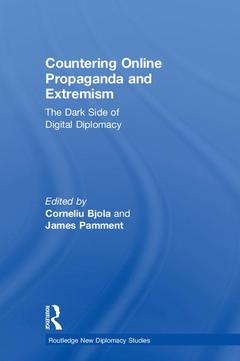Countering Online Propaganda and Extremism The Dark Side of Digital Diplomacy Routledge New Diplomacy Studies Series
Coordonnateurs : Bjola Corneliu, Pamment James

Exploring the ?dark side? of digital diplomacy, this volume highlights some of the major problems facing democratic institutions in the West and provides concrete examples of best practice in reversing the tide of digital propaganda.
Digital diplomacy is now part of the regular conduct of International Relations, but Information Warfare is characterised by the exploitation or weaponisation of media systems to undermine confidence in institutions: the resilience of open, democratic discourse is tested by techniques such as propaganda, disinformation, fake news, trolling and conspiracy theories. This book introduces a thematic framework by which to better understand the nature and scope of the threats that the weaponization of digital technologies increasingly pose to Western societies. The editors instigate interdisciplinary discussion and collaboration between scholars and practitioners on the purpose, methods and impact of strategic communication in the Digital Age and its diplomatic implications. What opportunities and challenges does strategic communication face in the digital context? What diplomatic implications need to be considered when governments employ strategies for countering disinformation and propaganda? Exploring such issues, the contributors demonstrate that responses to the weaponisation of digital technologies must be tailored to the political context that make it possible for digital propaganda to reach and influence vulnerable publics and audiences.
This book will be of much interest to students of diplomacy studies, counter-radicalisation, media and communication studies, and International Relations in general.
List of figures
List of tables
List of contributors
Acknowledgements
Introduction: the ‘dark side’ of digital diplomacy
Corneliu Bjola and James Pamment
Part I
Strategic communication
1 Propaganda as reflexive control: the digital dimension
Corneliu Bjola
2 Information influence in Western democracies: a model of systemic vulnerabilities
Howard Nothhaft, James Pamment, Henrik Agardh-Twetman and Alicia Fjällhed
3 A digital ménage à trois: strategic leaks, propaganda and journalism
Emma L. Briant and Alicia Wanless
4 The use of political communication by international organizations: the case of EU and NATO
Eva-Karin Olsson, Charlotte Wagnsson and Kajsa Hammargård
5 The unbearable thinness of strategic communication
Cristina Archetti
Part II
Countering violent extremism
6 The democratisation of hybrid warfare and practical approaches to defeat violent extremism in the Digital Age
Alicia Kearns
7 The aesthetics of violent extremist and counter-violent extremist communication
Ilan Manor and Rhys Crilley
8 Virtual violence: understanding the potential power of ISIS’ violent videos to buttress strategic narratives and persuade foreign recruits
Sean Aday
9 The battle for the battle of the narratives: sidestepping the double fetish of digital and CVE
Akil N. Awan, Alister Miskimmon and Ben O’Loughlin
Conclusion: rethinking strategic communication in the Digital Age
James Pamment and Corneliu Bjola
Works cited
Index
Corneliu Bjola is Associate Professor in Diplomatic Studies at the University of Oxford and Chair of the Oxford Digital Diplomacy Research Group.
James Pamment is Associate Professor and Head of the Department of Strategic Communication at Lund University, Sweden, and an external faculty member at the University of Southern California (USC) Center on Public Diplomacy.
Date de parution : 12-2018
15.6x23.4 cm
Date de parution : 12-2018
15.6x23.4 cm
Thèmes de Countering Online Propaganda and Extremism :
Mots-clés :
Young Men; digital diplomacy; UK Prevent Strategy; online diplomacy; Grand Theft Auto; propaganda; UK Foreign Office; counter-extremism; ISIS Propaganda; information war; UK Sovereignty; disinformation; Social Listening; James Pamment; CVE Strategy; Howard Nothhaft; CVE; Henrik Agardh-Twetman; Hybrid Warfare; Alicia Fjällhed; Violent Extremist Narratives; Emma L; Briant; Dg Enlargement; Alicia Wanless; Dg Trade; Eva-Karin Olsson; Dg RELEX; Charlotte Wagnsson; AQ Video; Kajsa Hammargård; Strategic Narrative; Cristina Archetti; Public Engagement; Alicia Kearns; EU Public Diplomacy; Ilan Manor; Execution Videos; Rhys Crilley; Casualty Coverage; Sean Aday; Civil Society; Akil N; Awan; Pop Culture Formats; Alister Miskimmon; Humanitarian Aid; Ben O'Loughlin; Strategic Communication



